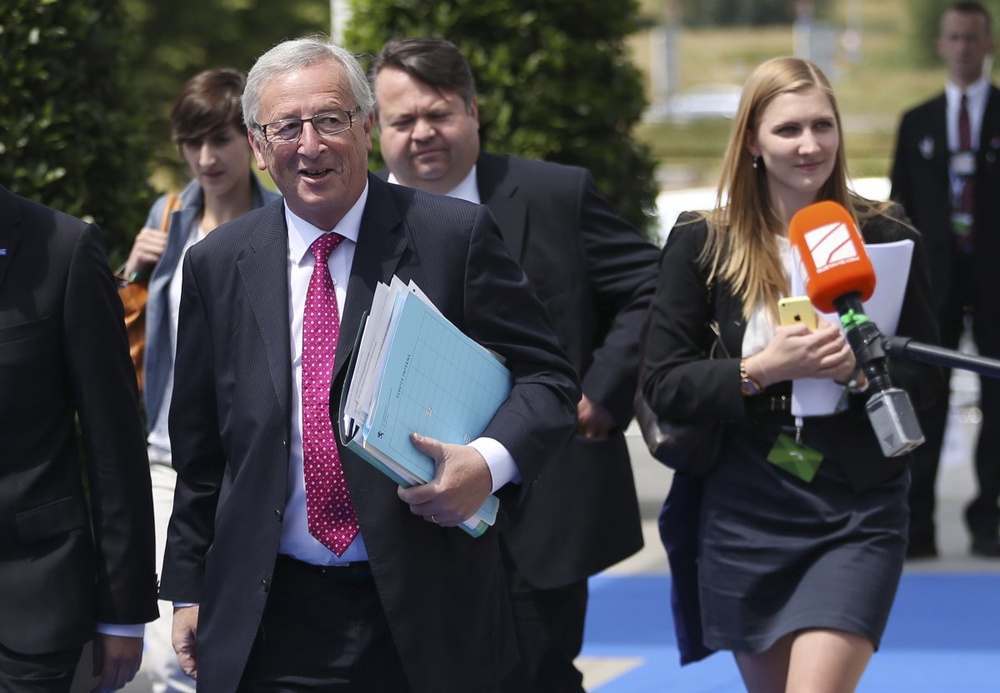
Jean-Claude Juncker has been named as the next president of the European Commission with backing from most EU leaders, dealing a bitter blow to opponent David Cameron and threatening to increase the chances of Britain leaving the bloc, AFP reports.





Jean-Claude Juncker has been named as the next president of the European Commission with backing from most EU leaders, dealing a bitter blow to opponent David Cameron and threatening to increase the chances of Britain leaving the bloc, AFP reports.
The British prime minister called Juncker's nomination a "bad day for Europe" and said it may hinder his efforts to keep Britain in the EU ahead of an in-out referendum set for 2017.
Juncker, a former Luxembourg prime minister and veteran EU insider, was backed by all EU member states except Britain and Hungary.
German Chancellor Angela Merkel, who some in London blame for undermining Cameron by switching her position on Juncker, praised his experience, saying he would "listen to the wishes of the member states and the European Parliament".
"I have a great interest in Great Britain staying a member of the European Union. In this spirit I will continue to work," she also said, alluding to the struggle European leaders now face to repair the relationship with Cameron ahead of the UK referendum.
But Cameron remained adamant in his opposition to the choice of Juncker to head the EU executive.
"It risks undermining the position of national governments, it risks undermining the power of national parliaments and it hands new power to the European Parliament," Cameron told reporters.
Asked if Britain was now closer to leaving the EU, he said: "The job has got harder of keeping Britain in a reformed European Union... Do I think it's an impossible job? No."
British newspapers on Saturday all shared the view that the country was nearing an EU exit after Cameron's "crushing" failure to block Juncker.
Even the largely pro-EU Independent warned of the increased likelihood of leaving the bloc with the headline, "Cameron Crushed - and UK edges closer to an EU exit."
The papers were divided over whether Britain was better off in "splendid isolation", some saying Cameron's handling of the Juncker battle would make it harder for him to renegotiate the terms of UK's EU membership.
'Career insider of Brussels'
EU leaders are expected to try to appease Cameron, potentially by offering London a top job in Brussels at a fresh summit next month that will decide a whole round of senior Brussels appointments.
But the dispute threatens to fuel eurosceptic sentiment in Britain ahead of the referendum, to be held if Cameron's Conservatives win next year's general election.
The disagreement over Juncker came a month after anti-EU parties made sweeping gains in European elections, with outright victories for the UK Independence Party in Britain and the National Front in France.
Merkel, Europe's most powerful leader, has urged EU colleagues to "compromise" with Britain.
And Cameron vowed to continue pushing for reforms in Europe such as the repatriation of some powers ahead of the referendum.
"This is going to be a long tough fight and frankly sometimes you have to be willing to lose a battle to win a war," he said.
Cameron also vowed to work with Juncker, despite describing him as "the career insider of Brussels".
A string of senior jobs in the EU are up for grabs this year, which could be used in an overall package to sweeten the pill of Juncker's nomination for Cameron.
Another summit is set to take place on July 16 to decide the positions, and analysts say a British politician could be offered a senior job.
Other compromises could include naming Danish Prime Minister Helle Thorning-Schmidt -- who made headlines with a selfie with Cameron and US President Barack Obama at Nelson Mandela's funeral last year -- as Herman Van Rompuy's successor as European Council president.
Away from disagreements over top jobs, European leaders signed landmark association and trade accords with Ukraine, Georgia and Moldova.
The pact, inked by Ukraine's new President Petro Poroshenko, has been at the heart of a months-long crisis in Ukraine and is fiercely opposed by Russia.
Poroshenko described the move as "a historic day, the most important day since independence" from Moscow in 1991.
It was then Ukrainian president Viktor Yanukovych's decision to put the agreements on ice in November, under pressure from Moscow, which led to protests in Kiev and his ouster, followed by Russia's annexation of Crimea and subsequent unrest in east Ukraine.


 +7 (777) 001 44 99
+7 (777) 001 44 99















































